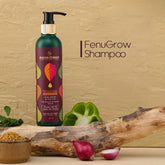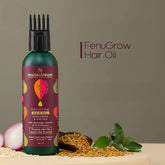Ayurvedic Hair Care: A holistic route to healthy hairs

Beauty and wellness are intricately bound. Looking beautiful entails having appealing skin, which eventually implies having well-nourished and healthy skin. Likewise, having attractive hair is traditionally linked with having long, healthy, and robust tresses. Both of these indications are historically associated with a healthy body. The entire Ayurvedic Hair Care market is now worth billions of dollars, and for a legitimate reason. Hair is an attribute that everyone strives for since it is one of the most vital aspects in assessing somebody's physical appeal.
However, due to a variety of circumstances such as a sedentary lifestyle, environmental variables, hormone imbalance, we frequently end up with disorders such as hair fall, premature greying, or thinning. Furthermore, many conventional hair care products include a high concentration of chemicals that can harm not only the hair but also the neurological and endocrine systems.
And the solutions we buy to cure our damaged hair sometimes have just a surface impact, leaving the underlying problems unaddressed. This is when the Ayurvedic remedy boots up to battle hair fall and loss. Ayurveda is based on a holistic approach to treatment. Not only are the techniques and products employed entirely natural, but they are also meant to fix the real source of the issue, which frequently stems from issues deep inside your body.
However, employing an Ayurvedic Hair Care routine might be complex or difficult at times if you don't have the right assistance. As a solution, here is a comprehensive guide that outlines every part of developing an ayurvedic hair care regimen to achieve healthy, resilient, and glossy locks. Before we get started, let's define what ayurvedic hair care comprises.
What is Ayurvedic Hair Care?
Ayurvedic Hair Care is all about absorbing the essence of natural and herbal remedies for hair, comprehending the science and anatomy of hair, and adopting a research-based holistic approach to hair care in order to sustain your hair feeling healthier and lustrous. Ayurvedic Hair Care is primarily concerned with rejuvenation (Rasayana), which entails profoundly nurturing the body at the cellular level in order to encourage healing and restoration.
There are several effective ayurvedic treatments for hair loss and hair damage that target the underlying issues and assist you in achieving the thick, glossy hair that you desire. Some important reasons as to why Ayurvedic Hair Care products are essential are as follows:
-
They are a wiser choice for the hair and are less likely to trigger scalp irritation or hair damage since they do not include any toxic chemicals. Natural ingredients are known to calm, nourish, and encourage lustrous hair. These products are mild on your hair and scalp and will not hurt you in the long haul.
-
These are better solutions for the environment. Using products that do not include hazardous chemicals like sulfates and parabens will absolutely assist your hair and skin in the long run.
How to Start an Ayurvedic Hair Care Routine?
Before we go into the intricacies, let us first comprehend the science of hair from an ayurvedic standpoint. Hair is a consequence of bone tissue, according to Ayurveda. Your hair is also related to the neurological system and the gut, so if any of these tissues degrade, the hair is liable to suffer. Similarly, if the quality of food available to the body's deep tissues is compromised, the hair will undoubtedly be affected.
To achieve overall wellbeing, Ayurveda employs the notion of Doshas or primary energies. Our bodies include the three Doshas: Vata, Pitta, and Kapha. When one or more Doshas are in excess, it has an impact on the body which eventually affects hair health too. Assuming that we all have a blend of different doshas in our bodies, it's very probable that your hair will exhibit traits from more than one dosha. It's quite rare to come across someone whose hair is purely Vata, Pitta, or Kapha-type.
The fundamentals of each of these three hair kinds are shown below; you may use them to figure out which ones best fit your hair.
-
Vata-type hair: Hairs of the Vata type are strong and healthy and are thin in volume yet coarser in texture. They grow quickly and are generally curly, straight, or a mix of the two. It might be tough to manage and style as you like, considering their unruly character.
-
Pitta-type hair: Pitta-type hairs are moderate in thickness, smooth in texture, and straighter in appearance. Individual strands appear to be fine, despite how simple it is to style.
-
Kapha-type hair: The texture of healthy Kapha-type hairs are rough, and they are thicker in density. Its look is typically curly. They are generally perceived to be the most attractive hair type.
Ayurvedic Hair Remedies according to your doshas:
Diverse hair types can indicate the fundamental dosha, and entire hair care regimens can be chosen depending on the dosha.
-
Features of Vata Imbalance:
Dull, lackluster hair that is frizzy, breaks out in knots, has split ends, and is harder to manage out is a sign of a Vata imbalance. This type of hair is also prone to damage.
Remedies: It is advised that you oil your scalp 2-3 times a week using Almond oil, Castor oil, Olive oil, or Sesame oil that has been treated with hair-boosting herbs like Bhringraj, Licorice, Shatavari, Ashwagandha, and others. An Ayurvedic Hair Treatment regimen based on Bhringraj herbs is recommended. -
Features of Pitta Imbalance:
An overabundance of pitta causes the hair follicles to heat, culminating in premature greying, hair loss, and baldness.
Remedies: Pitta hair care comprises massaging once or twice a week with Coconut oil soaked with herbs such as Hibiscus, Amla, Licorice, Kalonji seeds, Lodhra, and others. Pitta hair benefits from an Ayurvedic Hair Treatment regimen based on Japapatti and Brahmi. -
Features of Kapha Imbalance:
Because Kapha hair is naturally long and thick, and is not prone to premature greying or thinning, it requires the least amount of upkeep of the three doshas. An overload of Kapha may cause excessive oiliness in the scalp, making it more susceptible to dirt deposition and illness.
Remedies: Because of its proclivity to get oily, Kapha hair must be cleaned, twice a week, to keep the oil at bay. As this type of hair is vulnerable to dandruff, it is critical to invest in a good Ayurvedic Hair Shampoo enriched with traditional hair cleansing herbs such as Reetha, Shikakai, Hibiscus flowers, which effectively cleans the scalp.
Maintain an Ayurvedic Hair Care routine
Following this 3 step Ayurvedic Hair Care routine will absolutely guide you in achieving those healthy and nourished locks.
-
Regular Oiling:
With the enriching, fortifying, and nurturing characteristics of herbs, a daily scalp and hair massage with dosha-specific. Ayurvedic Oils stimulates thick, healthy, and glossy hair growth. Depending on your hair type, Ayurveda suggests regular oiling 2-3 times a week.
-
Wash your hair with good quality hair cleansers:
Hair follicles get blocked with an unpleasant buildup of excess oils, filth, and grime, which must be removed with a regular hair and scalp wash using cleansers infused with herbs like Reetha, Shikakai. Ayurveda suggests washing your hair 2-3 times a week using lukewarm water.
-
Conditioning your hairs with hair masks or herb-enriched conditioners:
One of the most efficient therapies for nourishing and profoundly conditioning your scalp and hair is either to use a hair conditioner rich in natural herbal extracts like Brahmi, Bhringraj, Neem, Tulsi or using a hair mask. To preserve, restore, and replenish your hair, Ayurveda recommends using hair masks once a week or every two weeks.
Ayurveda outlines and highlights natural hair care regimens that provide a variety of solutions for healthy, resilient, and glossy hair. The most essential attribute of Ayurveda is learning about the key facets of your hair and body and selecting the optimal ways to address those.





